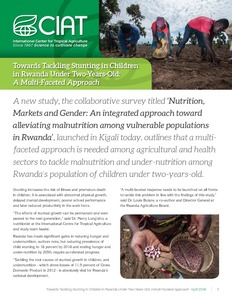Towards tackling stunting in children in Rwanda under two-years-old: a multi-faceted approach
Stunting increases the risk of illness and premature death in children. It is associated with abnormal physical growth,
delayed mental development, poorer school performance and later reduced productivity in the work force.
“The effects of stunted growth can be permanent and even passed to the next generation,” said Dr. Mercy Lung’aho, a nutritionist at the International Centre for Tropical Agriculture and study team leader.
Rwanda has made significant gains in reducing hunger and undernutrition, authors note, but reducing prevalence of
child stunting to 18 percent by 2018 and ending hunger and under-nutrition by 2050, require accelerated progress.
“Tackling the root causes of stunted growth in children, and undernutrition - which drove losses of 11.5 percent of Gross Domestic Product in 2012 - is absolutely vital for Rwanda’s national development.
“A multi-faceted response needs to be launched on all fronts to tackle this problem in line with the findings of this study,” said Dr. Louis Butare, a co-author and Director General at the Rwanda Agriculture Board.

